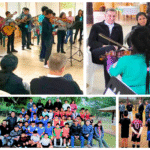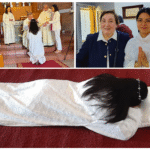By F. Luis Casasus, General Superior of Idente missionaries
Commentary on the Sunday Gospel of 14-1-2018, II Sunday in Ordinary Time.(1st book of Samuel 3:3b-10.19; 1Corinthians 6:13c-15a.17-20; John 1:35-42).
1. Nothing can frustrate the apostolic action. Samuel grew up, and the Lord was with him, not permitting any word of his to be without effect. These words in the first reading summarize the daily miracle in the life of an apostle.
This is what the experience of saints has shown over the centuries. Take for instance, the case of the two Patrons of the Missions: from Saint Francis Xavier who travelled through Asia proclaiming the Good News, to Saint Thérèse of the Child Jesus who was a missionary even though she never left the Carmelite convent.
Moreover, Saint Francis Xavier hardly knew the languages of the people he was evangelizing and Saint Thérèse did not have the best religious community with her. Their respective missions were plagued with difficulties because of their personal lack of certain specific skills or the defects of those around them.
God’s calling cannot be reduced to an invitation, since all those God calls he also justifies and glorifies. He cannot err, even though we make many mistakes and experience uneasiness and psychological disappointment. The power of God is clearly seen best against the background of human inadequacy. The truth is that our inadequacy may actually prove to be our ultimate qualification in serving God. God’s eternal plan cannot change; God’s promises cannot fail; God’s calling cannot be revoked; the merit of Christ’s life and death cannot be destroyed; and the sealing of the Holy Spirit cannot be withdrawn. If a person chosen by God is faithful, his/her example will draw souls to God in a usually unexpected way; if he/she is lukewarm or even scandalous, the Holy Spirit will make us of it…to draw souls to God in a usually unexpected way.
We always repeat that to be an apostle means to “be sent” but it also means to be a “sender”. Not a sender to ourselves, to our plans, to our human constructs, rather a sender to Christ. If we find ourselves thinking: I am not prepared enough, I am not holy enough, etc., remember that, on the one hand, you are not alone, Christ is there to help you, and, on the other, that you are not there to present yourself, rather Christ. If we humbly make straight his ways, He will do the rest. This is why the apostolic action cannot be frustrated, nor can it remain half-finished; it must be fully effective in spite of our uselessness or inability. His calling of us cannot be thwarted, even by our disobedience.
Making straight his ways means to remove the obstacles that keep us quenching our “thirsty desires” by earthly means. This is why Jesus never tired of calling His disciples to give His peace, to first and foremost give the unique, divine, strong and distinctive mark of those who only have an only intention: to point at Him. The glory of God shines in us as we make the presence of Christ felt in the way we live out our lives, in humble service and charity. Those are the innocents. Their spiritual and moral power reaches everyone: A cruel person, like King Herod feared that the child whom the wise men sought would be a rival and would supplant him; but also the innocence of the Child Jesus changed the lives of those who open their hearts, like the Wise Men.
My personal testimony, after having met our father Founder, is that his innocence was the most powerful instrument the Holy Spirit used to kindle my vocation to the missionary life. And I am not the only one who can give this testimony… With the grace of God, our doing of small things with love and faith makes a difference: An incident that occurred during one of the horrific mine explosions when many miners were trapped in darkness in the bowels of the Earth. The explosion had plunged them into total darkness. One of the terrified family members said: We have to get some light to them so they won’t give up hope! One of the rescuers was able to attach a light at the end of a long wire and drop it down through a small crevice in the rocks to give a tiny glow of light to the miners trapped below. Upon rescue, one of them said how much that light meant to them…a light in the darkness…. knowledge that someone was there keeping watch and providing the light.
Peter, who would become the leader of the Church, was not called directly by Jesus but by his brother. How many people, who could do great things for Jesus and the people, are waiting for me to bring them to Jesus?
2. God needs us. What a great mystery! But, as Pope Francis repeats, we have to enter into the mystery, even though we cannot fully understand it.
In today’s second reading we hear Saint Paul saying: The body is not for immorality. A well-intentioned, correct, but a bit limited interpretation of this text is: Avoid fornication,
masturbation and similar impure acts. Of course, this is an essential prerequisite, but we should not overlook that Saint Paul ends with a very positive and truly mystical note:
Do you not know that your body is a temple of the holy Spirit within you, whom you have from God, and that you are not your own? For you have been purchased at a price. Therefore, glorify God in your body. Our salvation is not only to be pulled us out of the waters of death, but to become one spirit with Him, as Paul himself clarifies. Therefore, often, God needs us to design another miracle like in Cana or in the multiplication of loaves…for others. Yes, we can do something that God cannot: repent. In this sense we are complementary, indispensable for the miracle of conversion of our neighbors. This is both a mystery and a miracle. Again, as St. Paul said: In our weakness is our strength. This is the rule, not the exception, in our spiritual and apostolic life, although we can see this in some memorable and significant moments of everyday life. Allow me to illustrate this with a simple (perhaps simplistic) story:
A 10-year-old boy decided to study judo despite the fact that he had lost his left arm in a devastating car accident. The boy began lessons with an old judo master. The boy was doing well so he couldn’t understand why, after three months of training, the master had taught him only one move.
“Master,” the boy finally said, “Shouldn’t I be learning more moves?” “This is the only move you know, but this is the only move you’ll ever need to know,” the Master replied. Not quite understanding, but believing in his teacher, the boy kept training.
Several months later, the Master took the boy to his first tournament. Surprising himself, the boy easily won his first two matches. The third match proved to be more difficult, but after some time, his opponent became impatient and charged; the boy deftly used his one move to win the match.
Still amazed by his success, the boy was now in the finals. This time, his opponent was bigger, stronger, and more experienced. For a while, the boy appeared to be overmatched. Concerned that the boy might get hurt, the referee called a time-out. He was about to stop the match when the Master intervened.
“No,” the Master insisted, “Let him continue.” Soon after the match resumed, his opponent made a critical mistake: He dropped his guard. Instantly, the boy used his move to pin him. The boy had won the match and the tournament. He was the champion.
On the way home, the boy and Master reviewed every move in each and every match. Then the boy summoned the courage to ask what was really on his mind. ” Master, how did I win the tournament with only one move?”
“You won for two reasons,” the Master answered. “First, you’ve almost mastered one of the most difficult throws in all of judo. And second, the only known defense for that move is for your opponent to grab your left arm.” The boy’s biggest weakness had become his biggest strength.
A final note about this second reading. When Paul talks about our body, he is referring not only to the material part of our person, but to the complex unity of our material and psychological being (the flesh, in biblical language). This is why not only Chastity, but also Poverty and Obedience are prerequisites to sanctity, as we declare in our religious Profession: sanctity would not be possible while loving riches, impurity and rebelliousness, the three concupiscences which we refer to the things, to the flesh and to the spirit. These are the three dimensions of our appetites, of our greed.
3. A personal encounter with Christ is seen in the transformation of the person.
It was about four in the afternoon. That the exact time was noted means that the disciples could not forget that memorable day. How many of our friends, family members, brothers of our community and neighbors have seen us attend Mass, or our Examination of Perfection, only to return to our lives by the same way, speaking in the same manner, complaining about the same issues, failing to put more effort into the spiritual life. Do our retreats, daily observance and bible reflection change our heart or mind? Every time we have a deep encounter with God, it is manifested, not by what we say, but by our transformed lifestyle, in the way we live and in our mission and perspective of life. Thus, Simon underwent a total change, not only in name, but his life and mission were totally changed. So radical is this calling that Jesus even gives us a purpose to die for what we believe, just as He died, for He knows that to live one must die for others.
Here are some of the signs presented by those that have been elected to be apostles:
*Authentic charity which the apostle lives, does not spring from mere empathy and identification with our fellowmen but the basis for our charity must spring from a new consciousness of our identity as God’s children in Christ. The verb that closes the passage is beautiful: Jesus looked at him. To look means literally to look inside, to discover the nature of our true and unconditional love.
*A genuine encounter with Christ brings about a sense of mission. Come and see means also to actually see the reality of our lives and the life of our neighbors. It is interesting that Saint Teresa of Jesus defined this earthly life as A bad night, in a bad inn. She was not exactly a depressive person, rather an energetic and decisive woman; therefore, we should think that it is a revelation, a new vision to see that every human being is a traveler, a pilgrim, someone who is not at home. The greatest gift we can give to anyone is the gift of Jesus, the only one capable of telling us what to do in this world.
*What are you looking for? The answer to the question tells me a lot about where I stand with God, with other people and with myself. This should be a point of my daily meditation, to realize the distance between my intention and the will of God at any given moment.
*A deep encounter with the Lord is seen in a new tendency to give thanks, to repent and to willingly repeat with Jesus thy will be done again and again. Those who have never encountered God’s love deeply tend to make their prayers primarily one of “petitions”.
*After a person has been touched by God to be an apostle, he desires only to do His will: My God, I delight in your law in the depth of my heart (Psalm 40). This is a genuine experience of Mystical Quietude, which is not at all static or inactive.
* Those who have been chose by Christ to help Him in his mission, read the Bible as the Word of God and not just some human thought. Following the example of Mother Mary, meditate on it night and day, not only in some moments of intellectual curiosity, but with a permanent state of hunger and thirst, seeking an answer, a solution for their apostolic challenges. * As Pope Paul VI tells us in Evangelii Nuntiandi, the Apostolic and missionary fruitfulness is not principally due to programs and pastoral methods that are cleverly drawn up and “efficient”, but is the result of the community’s constant prayer. On the other hand, a religious community that speaks so much about the love and mercy of God but does not live it, makes it difficult for anyone to believe that such teaching is real and true.
* Jesus calls us by treating us with honor: affirming our goodness and giving us hope. In Saint Peter, Jesus was able to see his sincerity, notwithstanding his rashness and impulsiveness. Yet in each and every one of us, Jesus sees more than what we or others could see. We too, the aspiring apostles, must affirm our neighbors in their goodness, strengthening them in their virtues, encouraging them in their efforts, consoling them in their failures and forgiving them when they fall. It is not enough to suggest them to attend the Mass.











